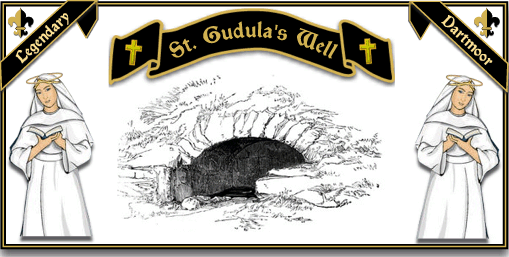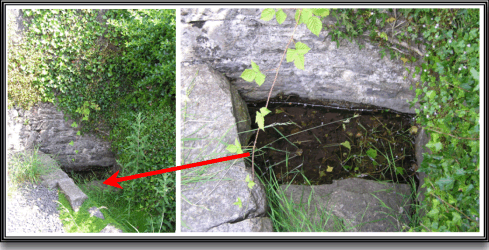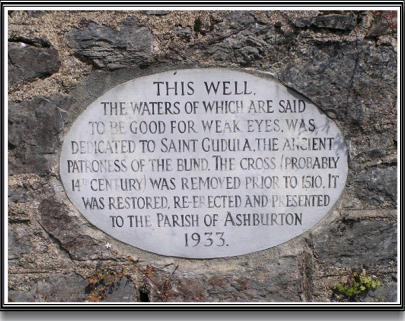
On the edge of the old Stannary town of Ashburton is an small sacred well. On my last visit it looked like an insignificant weed-choked gutter but for centuries it has been a place of pilgrimage. Sited by the old Totnes road, the tiny well is said to have curative powers that within living memory have been taken to cure eye problems.

St. Gudula’s Well – June 2005
There are two schools of thought as to exactly who the well is named after. Harrison, 2001, p.159 states the well was dedicated to St. Gudula, the ancient patroness for the blind.” Farmer, 1997, p.226, notes that Gudule or Gudula was born in Hamme, (Flanders) around AD648, her mother was Amalberga a niece of the emperor Pepin. She was educated by her cousin ‘Gertrude of Nivelles’ and upon her death Gudula dedicated her life to prayer, fasting and almsgiving. During this period she lived at Brabant and early every morning would travel the two miles to the church at Moorsel. Gudula died around AD712 and her body was taken back to Hamme where it was buried in front of the church door. Her remains were later taken to Moorsel and then in AD978 they went to Brussels. Gudula is known as the patron of Brussels. Iconography always depicts her with a candle or lantern as it was said that on her dark, early morning trips to the church at Moorsel the Devil would appear and blow out her candle in the hope she would be unable to attend to her prayers. Divine power was said to have relit the flame every time it was blown out.
It is interesting to note that there is no mention of her being the patron saint of the blind or weak sighted in any of the main hagiographical sources. In addition there is no record of her ever leaving her country of birth so it is possible that St. Gudula has no connection with the Ashburton well at all!

Plaque found on the wall of the well enclosure.
The second school of thought is that the well was named after St. Gudwal or Wolvela. Gudwal was born of suggested royal blood somewhere of the coast of Britain, possibly Wales or Cornwall. Farmer, p.226 describes him as an obscure Celtic abbot of the 6th century who was one of the first to bring Christianity to Brittany. It is possible that the centres for his cult were on the islands of Plecit where he built a monastery and Guer. It is thought that after his death the ‘Gudwal Cult’ moved to England, possibly around the 9th/10th centuries. He is patron of Finstall (Worcester) and the church at Gulval (Cornwall) is said to be dedicated to him. During his time he was famed for commanding the sea to remain at its lowest point near his monastery, healing the sick, raising the dead and seeing angels. Pilkington, 1989, pp19-20, suggests he was born in Wales about 500AD and became an Abbot of a community of monks on “a small island called Plecit off the Welsh coast.” If Plecit is “off the Welsh coast” it would take ages for the tide to come in, from Brittany it would have to cross the English Channel and then flow up the Bristol Channel. He then goes on to say that Gudwal travelled widely in the South-West and founded communities in Devon and Cornwall during which he may have blessed the well at Ashburton. Faull, 2004, p.85 considers that Gudula is a “local interpretation of St. Gulwell who is also known as St. Wulvella, and was sister of Saint Sidwell of Exeter. John, 1986, p.78 says that Wolvela was the patron of Gulval was a feminine saint.
So here we have an author and a plaque which categorically state that the well was named after St. Gudula, and she was the “patroness of the blind” when consensus of opinion mentions no such thing. Two different authors then say that the well may have either been named after St. Gudula who was not a patroness of the blind or St. Gudwal. Two authors agree that he founded a monastery at Plecit, which one considers to be off the Welsh coast when the other and all maps show it as being of the Breton coast. Another author considers the well may have been named after St. Gulwell or Wulvella, two of them then agree that Wulvella/Wolvela was a female saint who the church in Gulval is dedicated to and a third avers that Gulval church was dedicated to St. Gudwal who was a man – confused?
Would like some more possible confusion? Although no longer named on modern OS maps at the nearby Gulwell Farm, despite it being incognito, there is still a ‘W’ for ‘well’ marked in its grounds. However, on the OS Devonshire CXIV.NE, Revised: 1904 map both farm and well are labelled as can be seen below. Could this have been the original holy well? William Crossing noted when writing about the cross that it: “Consists of the shaft only, and if it really was brought from the spring it must be long ago, for I learnt in 1892 from the late Mr. Perry, the owner of Gulwell, who was then eighty three years of age that it was in its present situation in the time of his grandfather.” p.107. The interesting words here are; “if it really was brought from the spring,” with the emphasis and the words – if it really! Does this suggest that he too proffered the possibility that maybe the original location of the holy well was at the farm?
I had better not comment any further because in my book, Sandles, 1997, p.40, although I don’t attribute a name to the well I do state that “Gudula, a Flemish saint and patron of blind people.” Which in light of recent research I will now freely admit was a load of nonsense. Personally I favour the well to be named after St. Gudwal the monk from Brittany.
There is also a stone cross stood near to the well and if you think the well is confusing you have seen nothing, therefore as it not part of this legend I will go no further.
Regardless of which saint blessed the waters, their curative powers have always been famous. Pilkington, p.20 describes how many of today’s locals can remember as children, filling bottles with the holy water to keep in the medicine cabinet.
Bibliography.
Crossing, W. 1987. The Ancient Stone Crosses of Dartmoor. Exeter: Devon Books.
Farmer, D. 1997 Oxford Dictionary of Saints, Ox. Unv. Press, Oxford.
Faull, T. 2004 Secrets of the Hidden Source, Halsgrove, Tiverton.
Harrison, B. 2001, Dartmoor Stone Crosses, Devon Books, Tiverton.
John, C. R. 1986 The Saints of Cornwall, Tabb House, Padstow.
Pilkington, F. 1989 Ashburton, The Dartmoor Town, Devon Books, Exeter.
Sandles, T. 1997 Pilgrimage to Dartmoor’s Crosses, Forest Pub., Liverton.
 Legendary Dartmoor The many aspects past and present of Dartmoor
Legendary Dartmoor The many aspects past and present of Dartmoor
